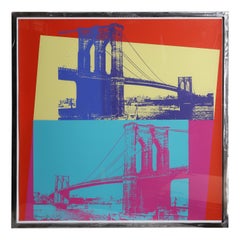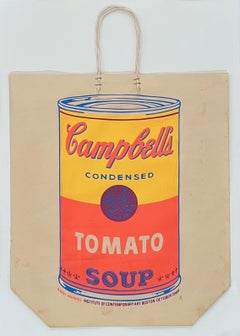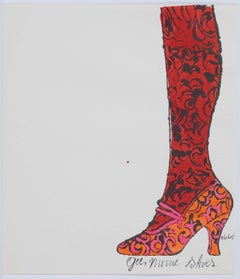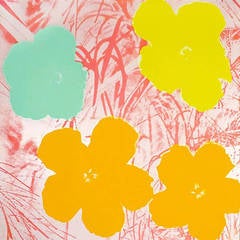Prints and Multiples
1980s Pop Art Prints and Multiples
Screen
20th Century Pop Art Prints and Multiples
Screen
1950s American Modern Prints and Multiples
Lithograph
1960s Pop Art Prints and Multiples
Archival Ink
1970s Pop Art Prints and Multiples
Screen
Fine Art Prints for Sale — Animal Prints, Abstract Prints, Nude Prints and Other Prints
Decorating with fine art prints — whether they’re figurative prints, abstract prints or another variety — has always been a practical way of bringing a space to life as well as bringing works by an artist you love into your home.
Pursued in the 1960s and ’70s, largely by Pop artists drawn to its associations with mass production, advertising, packaging and seriality, as well as those challenging the primacy of the Abstract Expressionist brushstroke, printmaking was embraced in the 1980s by painters and conceptual artists ranging from David Salle and Elizabeth Murray to Adrian Piper and Sherrie Levine.
Printmaking is the transfer of an image from one surface to another. An artist takes a material like stone, metal, wood or wax, carves, incises, draws or otherwise marks it with an image, inks or paints it and then transfers the image to a piece of paper or other material.
Fine art prints are frequently confused with their more commercial counterparts. After all, our closest connection to the printed image is through mass-produced newspapers, magazines and books, and many people don’t realize that even though prints are editions, they start with an original image created by an artist with the intent of reproducing it in a small batch. Fine art prints are created in strictly limited editions — 20 or 30 or maybe 50 — and are always based on an image created specifically to be made into an edition.
Many people think of revered Dutch artist Rembrandt as a painter but may not know that he was a printmaker as well. His prints have been preserved in time along with the work of other celebrated printmakers such as Pablo Picasso, Salvador Dalí and Andy Warhol. These fine art prints are still highly sought after by collectors.
“It’s another tool in the artist’s toolbox, just like painting or sculpture or anything else that an artist uses in the service of mark making or expressing him- or herself,” says International Fine Print Dealers Association (IFPDA) vice president Betsy Senior, of New York’s Betsy Senior Fine Art, Inc.
Because artist’s editions tend to be more affordable and available than his or her unique works, they’re more accessible and can be a great opportunity to bring a variety of colors, textures and shapes into a space.
For tight corners, select small fine art prints as opposed to the oversized bold piece you’ll hang as a focal point in the dining area. But be careful not to choose something that is too big for your space. And feel free to lean into it if need be — not every work needs picture-hanging hooks. Leaning a larger fine art print against the wall behind a bookcase can add a stylish installation-type dynamic to your living room. (Read more about how to arrange wall art here.)
Find fine art prints for sale on 1stDibs today.
Read More
Andy Warhol Piles Up the Gifts in This Fanciful Christmas Print
Created in the late 1950s, it’s one of a surprising number of holiday-themed works by the prolific Pop artist.
Jordan Schnitzer Started Collecting Warhol Prints Very Early — and Never Stopped
The Portland, Oregon, native has amassed a collection of art so outstanding that multiple museums bear his name and several exhibitions at any given time are showing pieces he owns. We caught up with Schnitzer to find out how he got started collecting Warhol and where his pieces can be found right now.
10 Reasons Art Collectors Are Obsessed with Andy Warhol
More than three decades after his death, the prolific Pop artist and cultural icon's body of work continues to captivate. Here's a primer of some of his most notable motifs and mediums.
Who Are the Most Popular Artists on 1stdibs?
Learn the stories of some of the world's most recognizable artworks and their makers.




